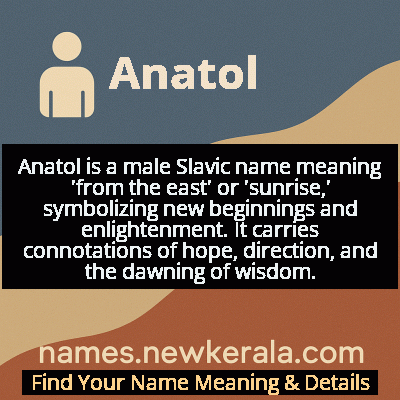Anatol Name Meaning & Details
Origin, Popularity, Numerology Analysis & Name Meaning of Anatol
Discover the origin, meaning, and cultural significance of the name ANATOL. Delve into its historical roots and explore the lasting impact it has had on communities and traditions.
Name
Anatol
Gender
Male
Origin
Slavic
Lucky Number
9
Meaning of the Name - Anatol
Anatol is a male Slavic name meaning 'from the east' or 'sunrise,' symbolizing new beginnings and enlightenment. It carries connotations of hope, direction, and the dawning of wisdom.
Anatol - Complete Numerology Analysis
Your Numerology Number
Based on Pythagorean Numerology System
Ruling Planet
Mars
Positive Nature
Generous, passionate, energetic, and humanitarian.
Negative Traits
Impulsive, impatient, moody, and can be overly emotional.
Lucky Colours
Red, maroon, scarlet.
Lucky Days
Tuesday.
Lucky Stones
Red coral, garnet.
Harmony Numbers
1, 2, 3, 6.
Best Suited Professions
Military, sports, philanthropy, leadership roles.
What People Like About You
Courage, energy, leadership, generosity.
Famous People Named Anatol
Anatol France
Writer
Nobel Prize in Literature winner, renowned French novelist and critic
Anatol Rapoport
Mathematician/Psychologist
Pioneer in game theory and mathematical psychology, founder of mathematical biology
Anatol Lieven
Journalist/Author
British journalist and author specializing in foreign affairs and international relations
Anatol Stefanowitsch
Linguist
German linguist and corpus linguist, professor at University of Bremen
Name Variations & International Equivalents
Click on blue names to explore their detailed meanings. Gray names with will be available soon.
Cultural & Historical Significance
Throughout history, bearers of this name have been associated with intellectual pursuits, artistic expression, and philosophical thought, cementing its position as a name denoting sophistication and cultural refinement. In Orthodox Christian communities, several saints named Anatolius contributed to the name's religious significance and enduring popularity. The name's journey through different cultures demonstrates how classical names were adapted and preserved within Slavic naming traditions while maintaining their original symbolic power.
Extended Personality Analysis
Individuals named Anatol are typically perceived as intellectual, analytical, and deeply thoughtful. They often possess a natural curiosity about the world and a philosophical approach to life's challenges. Their name's association with 'east' and 'sunrise' suggests personality traits of optimism, forward-thinking, and the ability to bring new perspectives to difficult situations. Anatols are frequently described as calm, methodical problem-solvers who approach life with careful consideration rather than impulsive action.
They tend to excel in academic and research-oriented fields, showing particular aptitude for complex systems thinking and abstract reasoning. While sometimes appearing reserved or introspective, they form deep, meaningful relationships and demonstrate remarkable loyalty to those they trust. Their combination of intellectual depth and quiet confidence often makes them natural leaders in specialized fields where expertise and careful judgment are valued. The name seems to attract individuals who value knowledge, tradition, and meaningful contribution over superficial success.
Modern Usage & Popularity
In contemporary times, Anatol maintains a steady though not overwhelmingly popular presence across Slavic-speaking countries and diaspora communities. The name enjoys particular resonance in academic and intellectual circles, often chosen by parents seeking a name with classical roots and sophisticated connotations. While its popularity peaked in the mid-20th century, it has experienced a modest revival in recent years as part of the broader trend toward traditional names with historical significance. In Russia and Ukraine, the variant 'Anatoliy' remains more common than the shortened 'Anatol,' though both forms are recognized and respected. The name's international appeal is enhanced by its relative ease of pronunciation across different languages and its association with notable figures in literature, science, and the arts.
Symbolic & Spiritual Meanings
Symbolically, Anatol represents enlightenment, new beginnings, and the eternal cycle of renewal. The name's connection to the east and sunrise makes it a powerful metaphor for hope, illumination, and the triumph of light over darkness. In various cultural contexts, it symbolizes the journey from ignorance to knowledge, mirroring the sun's daily ascent that banishes night and reveals truth. The name also carries connotations of direction and purpose—just as the east provides orientation in physical space, Anatol suggests moral and intellectual guidance. In Slavic symbolic systems, the east represents not only geographical direction but also spiritual awakening and cultural identity, making the name particularly resonant in contexts of national and personal transformation.

